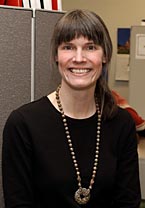Inside Iowa State | ||
Inside ArchivesSubmit newsSend news for Inside to inside@iastate.edu, or call (515) 294-7065. See publication dates, deadlines. About InsideInside Iowa State, a newspaper for faculty and staff, is published by the Office of University Relations. |
February 11, 2005 Parents' influence on children may be stronger than they thoughtby Samantha Beres You're standing in the wings, ready to walk across the stage when your mother leans over and whispers, "Try not to stumble like you always do." Your name is called and you begin your walk -- and stumble. A self-fulfilling prophecy? Maybe. A new study by Iowa State researchers shows that parents may have self-fulfilling effects on the behavior of their children. Namely, their adolescents' consumption of alcohol. Psychology assistant professor Stephanie Madon, with researchers Max Guyll, Richard Spoth and doctoral student Jennifer Willard, used data from questionnaires completed by 115 parents and their seventh-grade children. (Family members knew their questionnaires would not be shared with other family members.) Each parent filled out a questionnaire that measured beliefs about his or her child's alcohol use. The adolescents filled out questionnaires that assessed their risk for alcohol use, as well as their past alcohol use. One year later, the teens filled out another questionnaire that ascertained their alcohol use over the past month. The results showed that children drank the most alcohol when both parents held unfavorable beliefs about their child's alcohol use the year before -- that is, when both mother and father had overestimated their child's alcohol use relative to what the child's risk factors predicted. Strength in numbersMadon describes these results in her paper with a term she coined "synergistic accumulation." "What the term means is that the combined self-fulfilling effects of two or more people is more powerful than their individual self-fulfilling effects added together. "This is the first study to test whether self-fulfilling prophecies can accumulate in this way and the results are very important, especially since only unfavorable beliefs accumulated," Madon added. The results in Madon's research showed that though favorable beliefs held by one or more parent correlated with the child drinking less, the favorable beliefs did not accumulate. Specifically, the amount of alcohol a child was predicted to drink was similar relative to the prediction based on the child's risk factors, regardless of whether one or both parents underestimated their child's alcohol use. "At the same time, if even just one of your parents has a favorable belief about you, it's a protective factor," Guyll said. "And it's not like we're saying that if both parents have a negative belief, a child is doomed, but the child may be at somewhat greater risk." Where false beliefs regarding alcohol consumption come from may vary. Madon suggests media campaigns, rumors or even fear. And, she added, "Parents tend to be quite accurate about their children's alcohol use, but even a belief that is largely accurate, may not be completely accurate." Source of the 'prophecy'So how does this self-fulfilling prophecy happen in the first place? "I always give the example of teachers and students," Madon explained. You need three elements for the self-fulfilling prophecy to occur:
Madon added that the literature over the years has argued that the self-fulfilling effects of one person's false beliefs on another's outcomes are small, "but we interact with lots of different people, not just one person. At the heart of this study is that the self-fulfilling effects caused by different people's unfavorable beliefs can accumulate," she said. Feeding stereotypes?The results may be significant when taken into account for groups that often are stereotyped, such as members of minority groups. These individuals are disproportionately exposed to unfavorable beliefs from many different people, across many different contexts, and over the course of many years. If these unfavorable beliefs are inaccurate for a particular individual, they could have a self-fulfilling effect on that individual's future behavior. Madon's research suggests that as the number of people holding these unfavorable beliefs increases, so too does their combined self-fulfilling effects. Madon and her group's paper, "Self-fulfilling prophecies: the synergistic accumulative effect of parents' beliefs on children's drinking behavior," appeared in Psychological Science (vol. 15 No. 12, 2004). |

Psychology assistant professor Stephanie Madon led a research team that looked at how parents' beliefs about their children affected the kids' drinking behavior. Photo by Bob Elbert. |
|
Ames, Iowa 50011, (515) 294-4111. Published by: University Relations, online@iastate.edu. Copyright © 1995-2005, Iowa State University of Science and Technology. All rights reserved. |
||